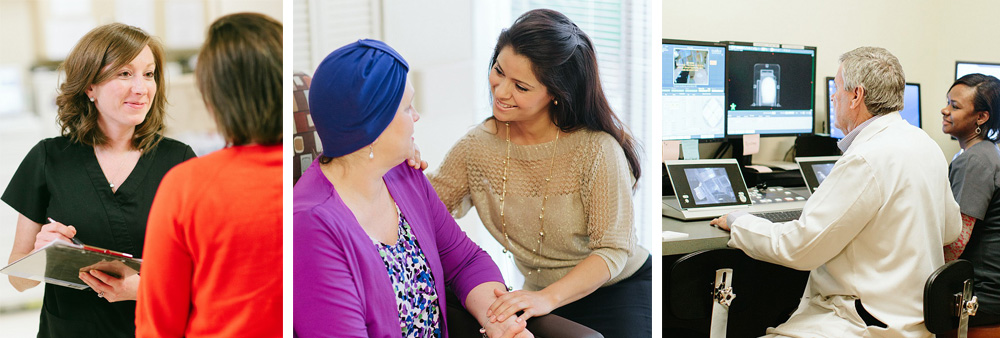Breast cancer is the second leading cause of cancer death in women. In fact, the chance of a woman having invasive breast cancer is about one in eight. Fortunately, in the last few decades, early detection and new treatment options have dramatically improved your chances of beating breast cancer and getting back to living your life.
NGMC offers four locations for cancer care, treating approximately 3,000 new patients each year with the most advanced cancer-fighting technologies.
Contact your doctor if you experience any of these symptoms, but keep in mind that many breast lumps are not cancerous, but rather benign.
- A painless lump or mass in or near the breast
- A change in breast size or firmness
- Breast skin changes such as dimpling, a sore, nipple itching, burning, rash, turning inward or discharge
- A warm area in the breast
- Swelling under the armpit or of the arm
- Bone pain
Breast pain is usually a symptom of benign breast problems; only rarely does it indicate cancer. Contact us today for more information.
NGMC offers comprehensive services from advanced mammography technology, including 3D mammograms or breast MRI, to breast cancer diagnosis and staging. Our comprehensive program is here to provide the highest quality care, supported through our caring patient navigators who can help your family through the process.
Breast Cancer Care at NGMC
Northeast Georgia Medical Center (NGMC) offers specialized expertise in diagnosing and treating breast cancers. Whether you need advanced imaging services, like 3D mammography, or access to research and clinical trials, NGMC’s award-winning program can develop a custom treatment plan for you, while providing compassionate guidance at every step.
Breast Cancer Treatment
Below are some of the many treatment options available for breast cancer patients at NGMC Our team of physicians, support staff and cancer patient navigator will help you determine which treatment options are best for you and how to navigate the treatment process.
Breast Cancer Research
Northeast Georgia Medical Center actively participates in clinical trials to make the latest treatments available to our patients and to advance the treatment options available to patients around the world in defeating cancer.
Certified Cancer Rehab
Patients who’ve undergone treatment for breast cancer may have specialized rehabilitation needs, including resources to help with lymphedema. Our goal at NGMC is to help our patients get back to living a full life, doing all the things they look forward to.
Support Services
From surgery to nutrition support and pastoral care, our goal is to help you live life as fully as possible throughout your treatment and in your life as a cancer survivor. NGMC offers a Patient Navigation Program with a dedicated breast cancer navigator to guide you through your cancer journey. If you’re struggling with keeping up with appointments, understanding the next steps, getting to and from appointments, or affording care and food for yourself at this time, please contact our Patient Navigation Program at 770-219-5812.
Choose NGMC for Breast Cancer Treatment
A breast cancer diagnosis is often overwhelming and unexpected. Northeast Georgia Medical Center prides itself on allowing patients to remain close to home, surrounded by friends and family as they receive personalized, high-quality cancer care. We follow nationally approved treatment guidelines and participate in clinical research so that patients have access to the most current treatment options. Our dedication to patient support and education is seen every day through our compassionate care team, including patient navigators, nurses, and physicians.
For more information about cancer care at NGMC or to learn about support groups, please call 770-219-8815.


